And the race of world powers to exploit the region's resources.
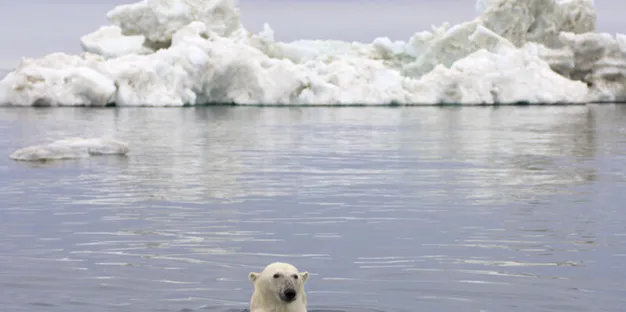
Hello ecotrain friends, I hope you are very well and having a wonderful start of the year, today I want to talk to you about a situation that although it is still in full development, promises to have great consequences on the world economy, geopolitics, and the lifestyle of millions of people.
I am referring to the melting of the polar ice caps at the North Pole as a result of global warming, and the consequences of such events, which include the opening of new routes for maritime trade, new deposits of oil, natural gas and minerals for exploitation, and the race of several nations to control territory, by force if necessary.
To understand why all this is so important you first have to understand what is happening in the far north, and how the changes brought to the map by global warming will change for better or worse the way the world views the Arctic.
What is happening in the far north?
To begin with, we have to accept that the disappearance of large portions of polar ice due to climate change is a fact that has been purchased, and that this process is accelerating rather than slowing down, in fact it is happening twice as fast as scientists predicted. Currently the ice-covered area around the North Pole is shrinking by 12.85% every decade on average according to NASA satellite data.
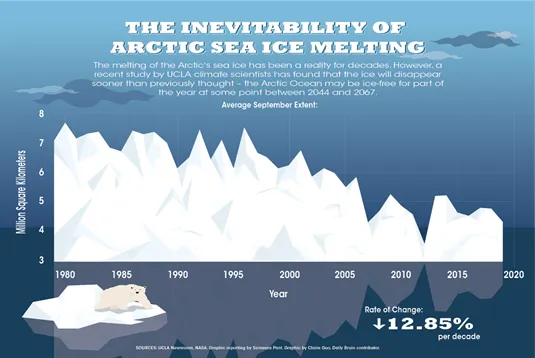
Here you can see the progress of the loss of frozen surface in the Arctic on a map. It goes from the late 1970s to 2020.
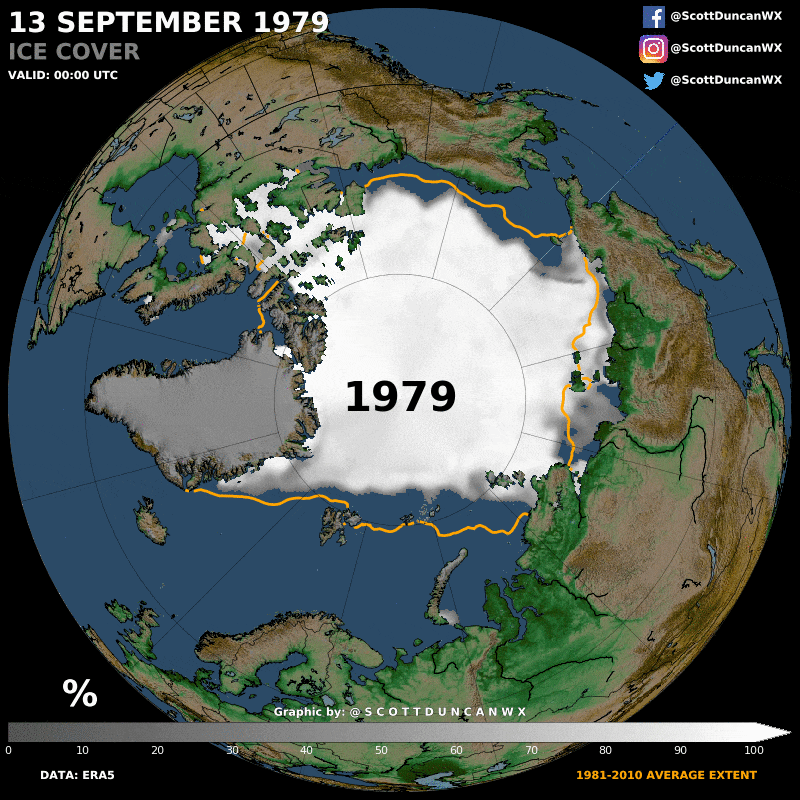
Of course all this is increasing the sea levels every day and has brought other consequences not only to the fauna of the region, but these consequences extend far beyond, near the North Pole, in the US state of Alaska, and some island communities are already in danger of being submerged under water due to rising sea levels.
https://www.businessinsider.com/what-life-is-like-in-kivalina-alaska-2017-9
But while many nations send spokespersons to express their governments' concern about climate change, the truth is that some of them see the melting of the poles not as a problem but as an opportunity. For as the ice sheets in the far northern sea disappear, new shipping routes open up for large cargo ships, routes that make journeys between Asia and Europe much shorter and save money on fuel. One such route, for example the Northeast Passage https://en.wikipedia.org/wiki/Northeast_Passage, can reduce the distance to travel between ports in South Korea, Japan or China to Europe by almost a third.
The Northeast Passage connects the Atlantic and Pacific oceans without having to sail across the Mediterranean, through the Suez Canal, or through dangerous piracy waters such as those near Somalia.
The NEP [Northeast Passage] would take cargo ships past the coasts of Norway, Finland, Sweden and a long passage through waters off the Arctic coast of Russia.
To get a better impression of what this means in distance I leave you with the following image.
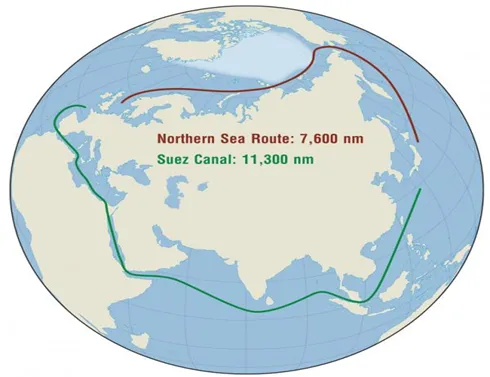
This would not only change the economic dynamics of trade, but also the political ones, since the countries close to the Suez Canal will not be able to exert as much political pressure by threatening to close this artery of global trade, but at the same time countries like Russia or Norway will have more power in the global economy by controlling the waters of the new maritime routes.
At a time like the present where the vulnerabilities of global trade have become evident with the container crisis, https://www.abc.net.au/news/2021-10-29/what-is-the-great-shipping-container-shortage-covid-christmas/100550198 and where it has also been demonstrated that even very local accidents such as the stalling of the Evergreen in the Suez Canal can have a tremendous impact on global trade, having alternative routes can be a valuable resource.
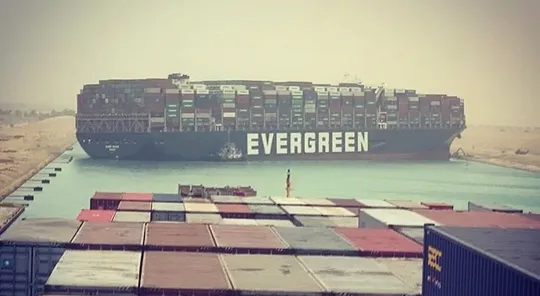
But it is not only new trade routes that have brought the melting of the poles, but also new reserves of natural gas and oil for exploitation, it is believed that under the Arctic are 13% of the world's undiscovered reserves of oil, and 30% of the world's undiscovered reserves of natural gas.
https://www.eia.gov/todayinenergy/detail.php?id=4650
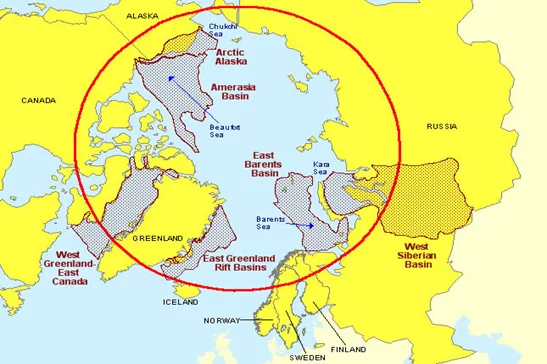
In addition to large reserves of valuable minerals in countries like Greenland, all this of course has been known to many nations for years, but it is only now, with the melting of the ice sheets that covered the sea with access to these reserves, that it is possible to exploit these resources.
And the race to conquer the Arctic has already begun, and some countries and companies will stop at nothing.
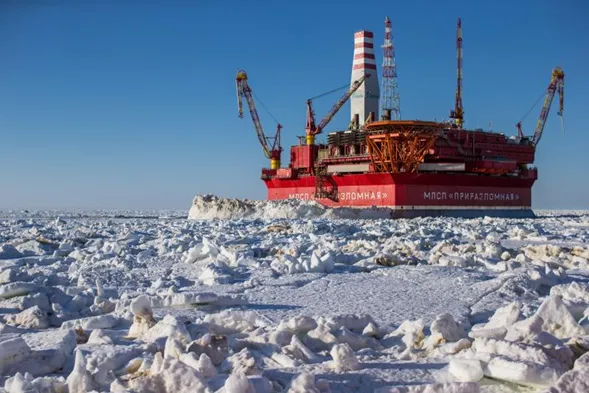
Now, according to international law, no country or nation state owns the Arctic Circle or the Arctic Ocean, but a group of 8 countries have territorial waters in the Arctic and also large tracts of surrounding land, Canada, Denmark, Finland, Iceland, Norway, Russia, Sweden, and the United States [through Alaska]. Each country has its own laws, its own environmental policy, and its own geopolitical interests. Currently, Russia and Norway are the countries that have launched themselves most forcefully into the conquest of the arctic, and have already begun to have friction over drilling rights and territorial limits https://www.euractiv.com/section/politics/short_news/norway-denies-russias-remarks-of-mounting-tensions-in-euro-arctic-region/.
Even powers such as China, which has no territory in the Arctic Circle, declared itself a near-Arctic nation to participate in the race for resources and control of new trade routes that have the potential to change the dynamics of power and trade in the world.
of course with such significant resources at stake, it is not surprising that some countries decide it is best to protect their interests by force if necessary, so in addition to oil companies, and shipping companies, the arctic will now also see a growing military presence from several nations to add to the tensions.
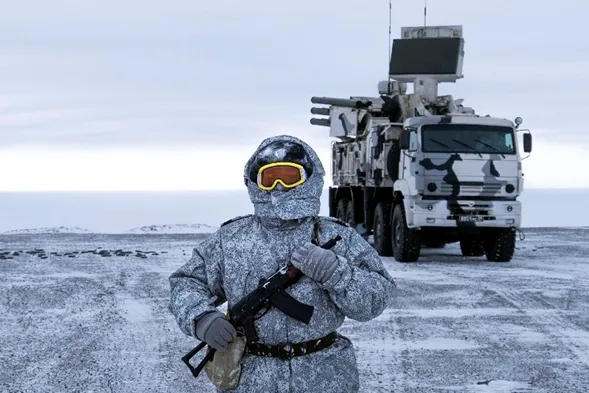
So with all this going on, it is valid to ask whether these nations with economic interests in the arctic circle area really want climate change to stop, or on the contrary, prefer it to continue accelerating in order to exploit the resources under the ice. Even countries with what we would call more environmentally sensitive policies such as norway have decided to exploit resources in the region despite the environmental impact it could have.
https://www.nytimes.com/2020/12/22/world/europe/norway-supreme-court-oil-climate-change.html
https://arcticyearbook.com/arctic-yearbook/2018/china-the-arctic/2018-sp-scholarly-papers/265-chinese-mining-in-greenland-arctic-access-or-access-to-minerals
and while the south pole has the protection of a number of international institutions that regulate the exploitation of resources and prohibit permanent military presence, effectively making Antarctica unpossessable to any particular nation.
https://en.wikipedia.org
/wiki/Antarctic_Treaty_System
In the far north this is not the case, and amidst the confusion, who claims responsibility in the event of an oil spill, or for heavy metal pollution from rare earth mining?
Although traffic on the sea lanes through the far north is still not possible all year round, several countries are building more and bigger icebreaker ships to keep them open for longer, some, like Russia's nuclear-powered Arctic model. https://www.arctictoday.com/full-speed-ahead-for-russias-new-fleet-of-giant-icebreakers/
This can also have consequences, as reducing the integrity of the ice sheet causes it to warm faster in the summer months, and also the opening of large water passages through the ice surface reduces the amount of sunlight it reflects back into the atmosphere, as it absorbs more sunlight, the sea warms faster, causing the melting of the poles to accelerate, https://physicstoday.scitation.org/doi/full/10.1063/PT.3.4712.
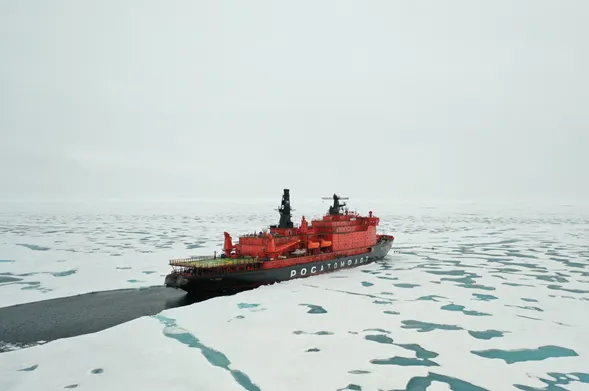
Military operations, all over the world, have as a priority the fulfillment of a mission, and in no case is the environmental impact of such operations considered, so if the tension for control of the region increases, so would the intensity of military operations in the region.
So at the end of this whole race, who are the big losers? the 4 million or so people who live near the Arctic Circle, who will see their homes and lifestyles destroyed, then the hundreds of millions of people around the world who live near the coastlines, who will see their land and homes swallowed up by the waters, something that as I have shown before, is already happening, and then, when famine, disease and extreme weather hit us all, the rich and powerful who are fighting over who will exploit the Arctic oasis the most will tell us that it is our fault for using plastic bottles and having over-consuming societies, they will be richer and more powerful and we will pay the consequences. But as the world collapses, eventually the chaos will catch up with them too.
To avoid such a future it is important to speak out and take action, but to know what to do we must first know what is happening, that is the purpose of this article, to spread the word about something that is happening right now so that you can make informed decisions.
Recommended Bibliographic Reference
[3] Russia us artic military.html
[4] 265 chinese mining in greenland arctic access or access to minerals